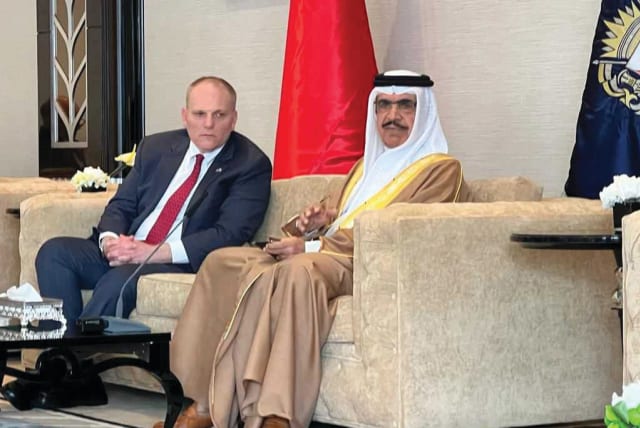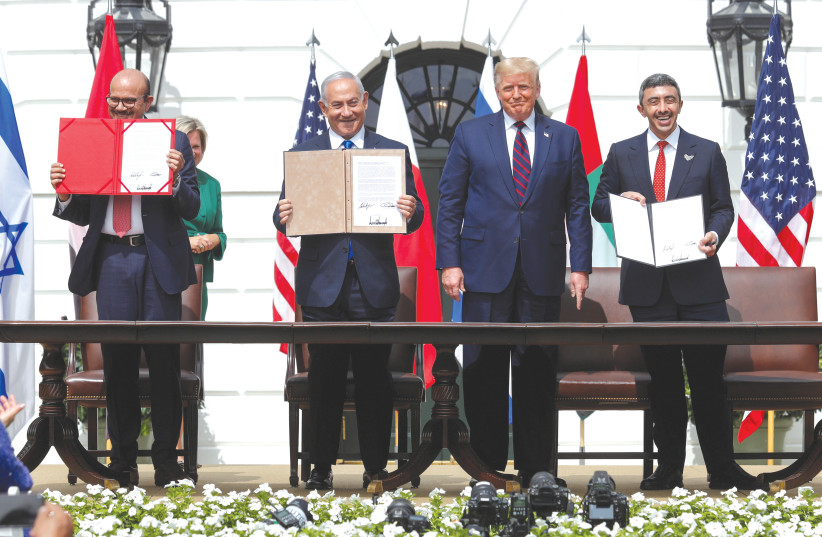Abraham Accords: A diplomatic success story worthy of US support - opinion

The Abraham Accords are alive and well and represent a significant opportunity for the Middle East. Fostering such agreements offers a path toward greater stability and prosperity.
The Abraham Accords transformed the Middle East by bringing Israel and its Arab neighbors closer together. The agreements ushered in a new era of collaboration, communication and understanding between nations that not so long ago were openly hostile to one another.
Over 500,000 Israelis have visited the United Arab Emirates in the two years since the signing of the accords, trade continues to skyrocket and the presence of Israeli naval vessels in the Red Sea signifies the new maritime cooperation between Israel and its Arab partners.
The enhanced security cooperation brought on by the Abraham Accords and the simultaneous inclusion of Israel with America’s other regional allies in the US Central Command makes the region fundamentally safer by providing a new bulwark for countering the security threats posed by Iran.
The Abraham Accords and the fears of US disengagement
And yet, despite these positive improvements that benefit the entire region, the future of the accords is arguably at a precipice. The perception that the US is shifting its attention away from the Middle East poses a serious challenge going forward, particularly now, as China takes an active role in diplomatic negotiations between Iran and Saudi Arabia.
The UAE, Bahrain, Sudan and Morocco signed the Abraham Accords in part to gain new allies against Iran’s destabilizing activities in the region. The growing perception that America has disconnected from these efforts erodes the overall confidence in that mission and makes our allies feel less like full allies.
In fact, during a recent meeting with a senior Gulf state official, he mused that the US is now a partner rather than an ally. While the massive amount of US attention on the Ukraine conflict explains some of the reasons behind the reduction in American engagement, it actually predates Russia’s invasion.
When Saudi oil fields were attacked during the Trump administration, likely by Iranian agents, many in the region deemed the US response slow and inadequate. Similarly, the lack of Biden administration response to drone and missile attacks on Abu Dhabi by Iranian-backed Houthi rebels has raised concerns about America’s commitment to defend its allies.
The mismanaged Afghanistan withdrawal also contributed to this phenomenon. By contrast, when the UAE came under attack, Israel was among the first nations to offer assistance, demonstrating the depth of the new relationship between the two countries.
These factors pose a significant drag on future cooperation, as nations are more likely to engage with US adversaries like China or Russia if they do not feel supported by the US. The US must act as and be seen as a reliable partner that honors its commitments and provides security for its allies when called upon. The Abraham Accords opened up new avenues for collaboration that were once unimaginable and it is crucial that the US remain engaged in this process.
The Abraham Accords are alive and well and represent a significant opportunity for the Middle East. Fostering such agreements offers a path toward greater stability and prosperity for the entire region and the world.
However, this opportunity will only be realized if the US is actively engaged in supporting its allies and promoting regional development. By doing so, America will ensure the Abraham Accords are not simply a historic achievement but are, in fact, a lasting success.
The writer is the chief executive officer of the Conference of Presidents of Major American Jewish Organizations. In that capacity, he is the senior professional guiding the Conference’s agenda on behalf of the 53 national member organizations, which represent a wide mosaic of American Jewish life. Follow him at @Daroff.
Jerusalem Post Store
`; document.getElementById("linkPremium").innerHTML = cont; var divWithLink = document.getElementById("premium-link"); if (divWithLink !== null && divWithLink !== 'undefined') { divWithLink.style.border = "solid 1px #cb0f3e"; divWithLink.style.textAlign = "center"; divWithLink.style.marginBottom = "15px"; divWithLink.style.marginTop = "15px"; divWithLink.style.width = "100%"; divWithLink.style.backgroundColor = "#122952"; divWithLink.style.color = "#ffffff"; divWithLink.style.lineHeight = "1.5"; } } (function (v, i) { });

